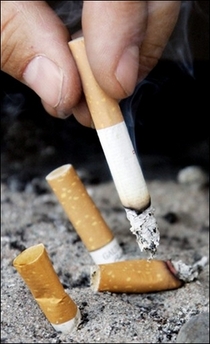Anti-smoking pill may help curb drinking
(AP)Updated: 2007-07-10 08:48
WASHINGTON - A single pill appears to hold promise in curbing the urges to both smoke and drink, according to researchers trying to help people overcome addiction by targeting a pleasure center in the brain.
Much further down the line, the tablets might be considered as a treatment for addictions to everything from gambling to painkillers, researchers said.
Several experts not involved in the study cautioned that there is no such thing as a magic cure-all for addiction and that varenicline and similar drugs may find more immediate use in treating diseases like Alzheimer's and Parkinson's.
Pfizer Inc. developed the drug specifically as a stop-smoking aid and has sold it in the United States since August under the brand name Chantix. Varenicline works by latching onto the same receptors in the brain that nicotine binds to when inhaled in cigarette smoke, an action that leads to the release of dopamine in the brain's pleasure centers. Taking the drug blocks any inhaled nicotine from reinforcing that effect.
A study published Monday suggests not just nicotine but alcohol also acts on the same locations in the brain. That means a drug like varenicline, which makes smoking less rewarding, could do the same for drinking. Preliminary work, done in rats, suggests that is the case.
"The biggest thrill is that this drug, which has already proved safe for people trying to stop smoking, is now a potential drug to fight alcohol dependence," said Selena Bartlett, a neuroscientist with the Ernest Gallo Clinic and Research Center at the University of California, San Francisco who led the study. Details appear this week in the journal Proceedings of the National Academy of Sciences.
Pfizer provided the drug for the study, but was not otherwise involved in the research.
More often than not, smoking and drinking go together - an observation pub-goers have made for hundreds of years. That a single drug could work to curb both addictions isn't a given - nor is it surprising, said Christopher de Fiebre, an associate professor of pharmacology and neuroscience at the University of North Texas Health Science Center at Fort Worth.
"This is an extremely important paper and hopefully it will convince the major funding agencies that they need to examine the interactions between nicotine and alcohol to a greater extent than they have done to date," said de Fiebre, who was not connected with the study.
In fact, the California researchers, together with the National Institute on Alcohol Abuse and Alcoholism, are now planning the first studies in humans of the drug's effectiveness in curbing alcohol cravings and dependence, Bartlett said. That the drug is already Food and Drug Administration-approved should speed things along.
"This is a drug that people are actually using. That's not trivial - not at all," said Mark Egli, co-leader of the medications development program at the NIAAA, part of the National Institutes of Health. "There is plenty of animal research that looks pretty cool but there is no way those drugs are ever going to be used by human beings."
In the new study, researchers trained rats to drink alcohol and measured the effect of varenicline once the animals became the laboratory equivalent of heavy drinkers. They found the drug curbed their drinking. Even when stopped, the animals resumed drinking but didn't binge.
Just as varenicline doesn't work for all smokers, it's highly unlikely it would for all drinkers.
"Is this going to be a cure-all? No, not for smoking or alcoholism because both diseases are more complicated than a single target or single genetic issue," said Allan Collins, a professor of pharmacology at the University of Colorado who was not connected to the study.
Still, Collins, who's worked on the topic for decades, called the drug's potential use in treating alcoholism a "no-brainer." And Egli said it supports the emerging view that there is a common biological basis for addictions to both alcohol and tobacco.
As for Pfizer, the New York company has yet to decide whether to seek broader FDA approval for the drug, a spokesman said.
"Without having considerable more data on this it would be very difficult for us to say we might pursue it or not. It's almost a wait-and-see," said Pfizer's Stephen Lederer.
|
|
|
||
|
||
|
|

